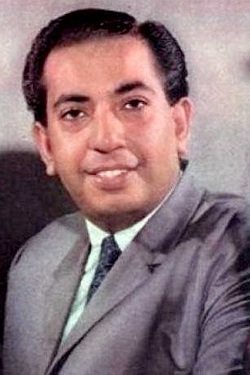
Mahendra Kapoor was an Indian playback singer. In a long career spanning decades, his repertoire included popular songs such as Chalo ekbaar phir se Ajnabi ban jayen hum dono (Gumrah) and Neele Gagan ke tale (Hamraaz). His name however became most closely associated with patriotic songs including Mere Desh Ki Dharti in Manoj Kumar's film Upkaar. He considered Mohammad Rafi as his Guru. In 1972, he was awarded the Padma Shri by the Government of India. He lent his voice to actor Manoj Kumar in most of his films and had a lengthy association with director-producer Baldev Raj Chopra. He also sang 2 English songs mahendra kapoor - yogi, please help me/ sally 1968. released on 45 RPM EP by the gramsphone company of india “His masters voice “

Bharatbhushan Gupta, better known as Bharat Bhushan was an Indian actor in Hindi language films, scriptwriter and producer, who is best remembered for playing Baiju Bawra in the 1952 film of the same name. He was born in Meerut, and brought up in Aligarh, Uttar Pradesh.
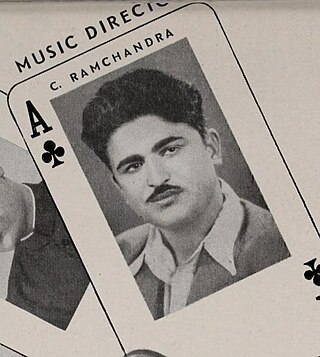
Ramchandra Narhar Chitalkar, also known as C. Ramchandra or Chitalkar or Anna Sahib, was an Indian music director and playback singer.

Meena Kumari was an Indian actress and poet, who worked in Hindi films. Popularly known as The Tragedy Queen, she is regarded among the finest and greatest actresses in the history of Indian cinema. In a career spanning 33 years, from child actress to adult, Kumari starred in over 90 films.

Baiju Bawra is a 1952 Hindi musical romantic drama film directed by Vijay Bhatt. Produced by Prakash Pictures, with story by Ramchandra Thakur and dialogues by Zia Sarhadi, Baiju Bawra was a musical "megahit" which had a mighty 100-week run in the theatres. Bhatt's decision to make a film based on classical music was met with scepticism by the Indian film industry due to its "lack of mass appeal", but the film and music turned out be an "overwhelming success".
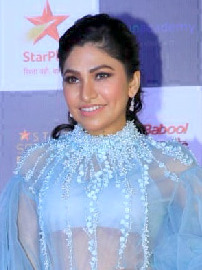
Tulsi Kumar Dua, popularly known as Tulsi Kumar, is an Indian playback singer, radio jockey, musician, and actress in the Bollywood industry. She was born to businessman Gulshan Kumar, the former owner of T Series who also worked as a singer, and his wife Sudesh Kumari. She is also the sister of film producer Bhushan Kumar and actress Khushali Kumar. She also owns Kids Hut, a YouTube channel owned by record label T-Series, featuring children's content including nursery rhymes and stories.

Sachin Pilgaonkar, often known mononymously by his screen name Sachin, is an Indian actor, director, producer, writer and singer of Marathi and Hindi films. He has directed and acted in several Marathi films of the late 1980s and early 1990s. He has received several awards including two National Film Awards and two Filmfare Awards Marathi.
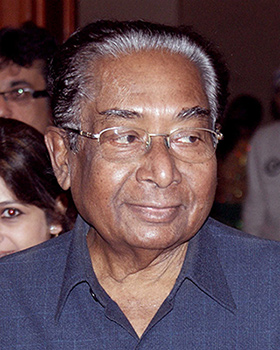
Sachin Bhowmick was an Indian Hindi film writer and director. Writing was his main work and he wrote stories or screenplays for over 94 films. He is best remembered for directing the light romantic black comedy classic Raja Rani (1973). He was also a regular contributor to Ultorath, a Bengali magazine on cinema. Due to the Bengali pronunciation of his surname Bhaumick we will find his surname spelled as Bhowmick in numerous sites.

Gulshan Kumar Mehta, popularly known by his pen name Gulshan Bawra, was an Indian songwriter and actor in Hindi cinema. In a career spanning 42 years, he has to his credit about 240 songs, he collaborated with noted music directors like Kalyanji Anandji, Shankar Jaikishan, and R. D. Burman. He composed almost half of the songs in films like Khel Khel Mein (1975), Kasme Vaade (1978) and Satte Pe Satta (1982). Apart from R. D. Burman hits, he is most remembered for his songs like 'Mere Desh Ki Dharti" in Upkaar (1968) and "Yaari Hai Imaan Mera" in Zanjeer (1974), both of which got him the Filmfare Best Lyricist Award. The latter also topped the Binaca Geetmala annual list of 1973. As a character actor, he also appeared in a small number of Hindi films.
Chitralekha is a 1941 Indian Hindi-language film, directed by Kidar Sharma and based on the 1934 Hindi novel of the same name by Bhagwati Charan Verma. Its music is by noted classical musician Ustad Jhande Khan, giving popular songs like "Sun sun Neelkamal Muskaye," "Saiyyan Saware Bhaye Baware," and "Tum Jao Bde Bhagwan Bane, Insaan Bano."

Chitralekha is a 1964 Indian Hindi-language historical drama film directed by Kidar Sharma and starring Ashok Kumar, Pradeep Kumar and Meena Kumari. It was based on the 1934 Hindi novel of the same name by Bhagwati Charan Verma about Bijgupta serving under the Maurya Empire and the king Chandragupta Maurya and his love for the courtesan Chitralekha. The film's music and lyrics were by Roshan and Sahir Ludhianvi, respectively. The film was noted for songs such as "Sansaar Se Bhaage Phirte Ho" and "Man Re Tu Kaahe na dheer dhare" which is a pensive song which conveys the quintessence of life about letting go of the good and bad. In 2010, Outlook India magazine asked 30 Indian leading composers, lyricists and singers to name their all-time favorite Hindi songs. A list of top 20 songs was published and the top of the chart was ‘Man Re Tu kahe na dheer dhare.’"

Duniya Ek Sarai is a 1946 Hindi-language film. Meena Kumari, after her career as a child artist, started doing adult roles as heroines in mythologicals and fantasy genres before she made it in mainstream cinema with Baiju Bawra (1952).
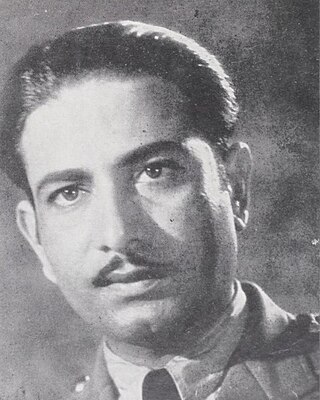
Hari Shivdasani (1909–1994) was an Indian character actor in Hindi cinema from 1930s to 1980s.
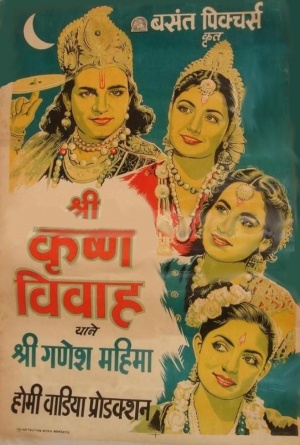
Shri Ganesh Mahima also called Shri Krishna Vivah is a 1950 Hindi mythological film directed by Homi Wadia. The film was made under Wadia's Basant Pictures Banner with music composed by S. N. Tripathi. Meena Kumari, after her career as a child artist, started doing adult roles as heroines in mythologicals and fantasy genres before she made it in mainstream cinema with Baiju Bawra (1952). The cast included Meena Kumari, Mahipal, S. N. Tripathi, Amarnath and Dalpat. It is a side story and indirect sequel to Hanuman Patal Vijay.
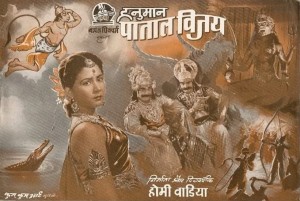
Hanuman Patal Vijay is a 1951 Hindi mythological film directed by Homi Wadia for his Basant Pictures banner. Meena Kumari starred in this devotional film with S. N. Tripathi playing Hanuman. Following her career as a child actress, Meena Kumari did heroine roles in mythologies made by Basant Pictures and directed by Homi Wadia. She had an extremely successful career for some years playing goddesses before her big commercial break in Baiju Bawra (1951). S. N. Tripathi, besides acting in the film, also composed the music. His costars were Meena Kumari, Mahipal, Niranjan Sharma, Dalpat and Amarnath.
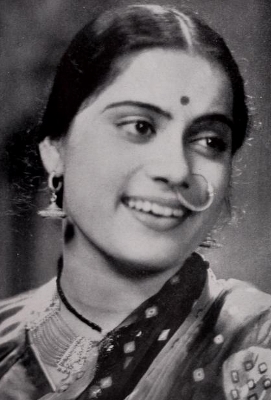
Shanta Apte (1916–1964) was an Indian actress-singer who worked in Marathi and Hindi cinema. Renowned for her roles in films like Duniya Na Mane/Kunku (1937) and Amar Jyoti (1936) under the Prabhat Films banner, she was active in Indian cinema from 1932 to 1958. Apte's impact on Marathi cinema "paralleled" that of Kanan Devi in Bengali cinema. Along with Kanan Devi, Apte is cited as one of the "great singing stars" from before the playback singing era. Apte began her career in films playing the role of a young Radha in the Marathi film Shyamsunder (1932). She joined Prabhat Films acting in her first Hindi language film Amrit Manthan in (1934).
Asad Bhopali was an Indian Hindustani poet and lyricist. The Encyclopaedia of Hindi Cinema, compiled by Gulzar and Saibal Chatterjee, describes him as one of the "few names that stand out for their contribution to Hindi film lyrics".

Veer Ghatotkach is a 1949 Hindi Indian mythological film, starring Meena Kumari, Shahu Modak, Sumiti Gupta, Vasant Pahelwan, Naranjan Sharma and S. N. Tripathi. Meena Kumari, after her career as a child artist, started doing adult roles as heroines in mythologicals and fantasy genres before she made it in mainstream cinema with Baiju Bawra (1952).

Meena Kumari was an Indian actress, playback singer, poet and costume designer who predominantly worked in Indian cinema between 1939—72. Meena Kumari started her film career with Leatherface, a 1939 film with the name Baby Mahjabeen. For around six years, Baby Meena, continued to appear as a child artist in a string of films before making her debut with Bachchon Ka Khel as Meena Kumari. However, it was the film Baiju Bawra (1952) which turned Kumari into an overnight star and Parineeta (1953) which further solidified her position as a bankable leading lady. For sometime, particularly till the late 1950s, Kumari continued to show off her versatility as an artist, featuring in films ranging from drama to fantasy and even comedy before adopting the genre which earned her the sobriquet— Queen of Tragedy.

















